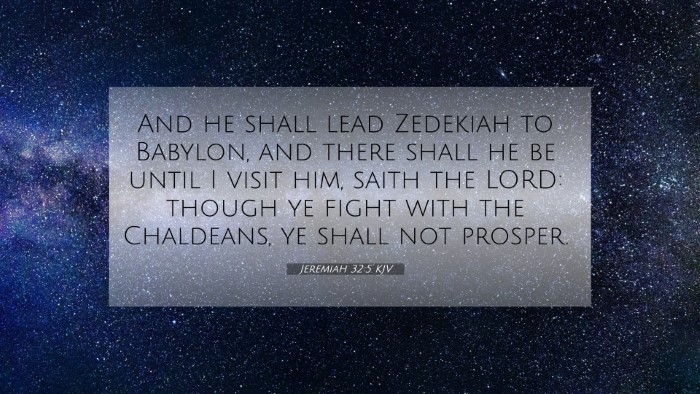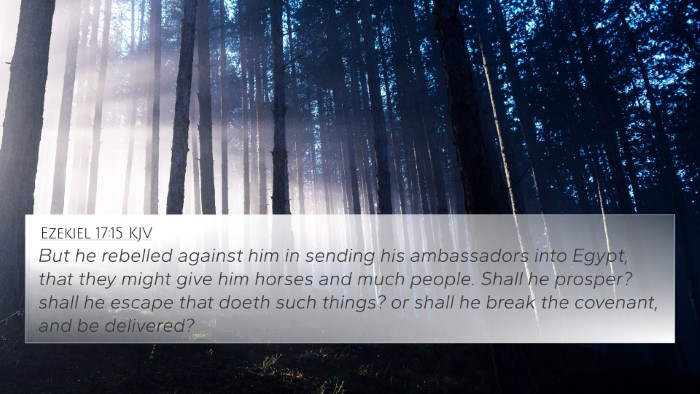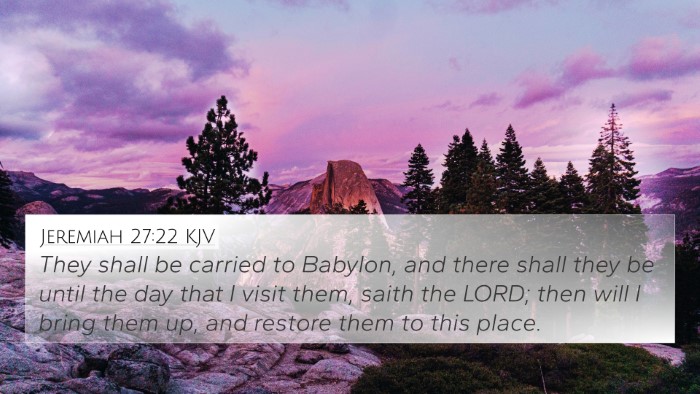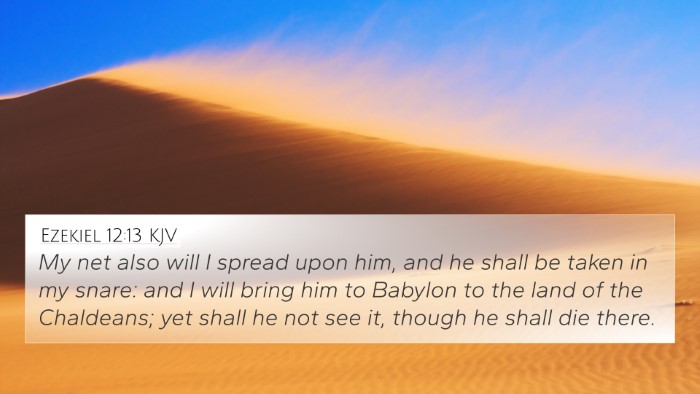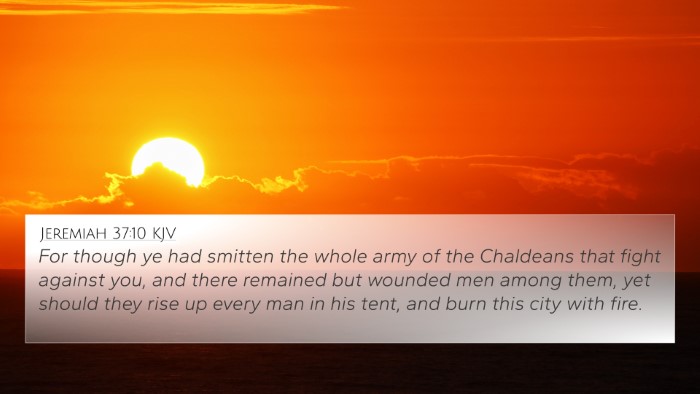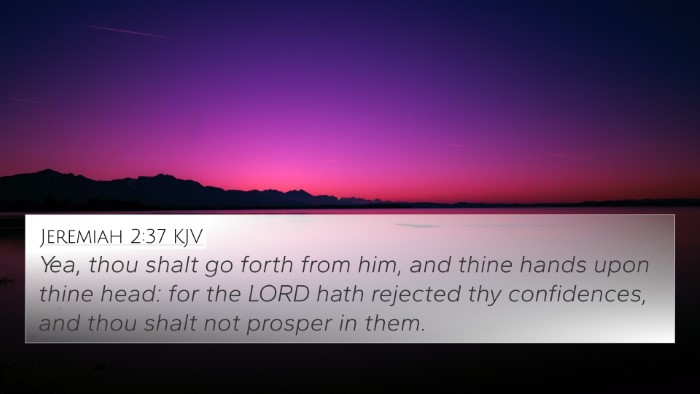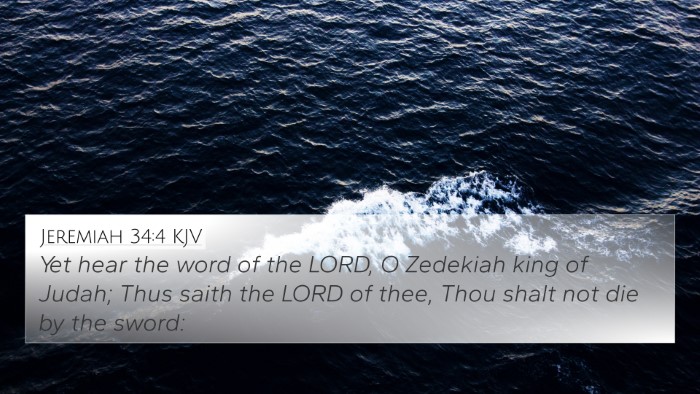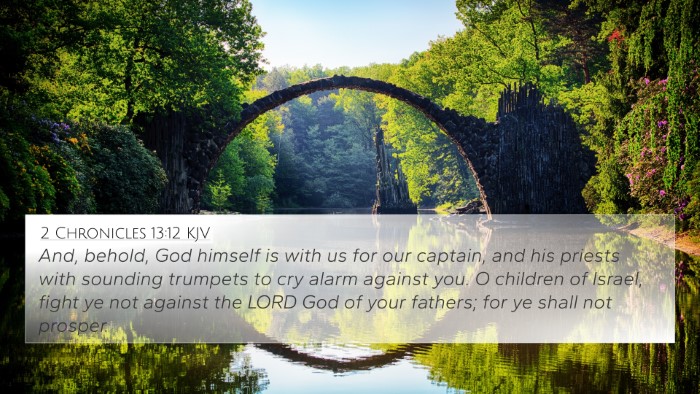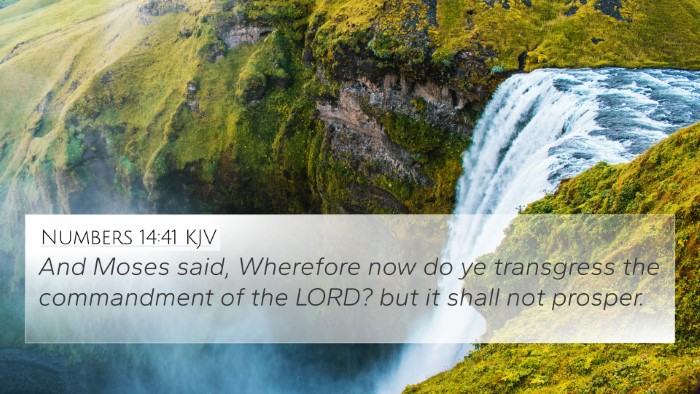Understanding Jeremiah 32:5
Jeremiah 32:5 states:
"And he shall be led to Babylon, and there shall he die, and shall be buried there, he and all his friends of whom he hath prophesied false." (Jeremiah 32:5)
This verse offers significant insight into the prophetic ministry of Jeremiah and the fate that awaited Zedekiah, the last king of Judah. Below is a detailed analysis based on public domain commentaries, including insights from Matthew Henry, Albert Barnes, and Adam Clarke.
Overview of the Context
Matthew Henry portrays that Jeremiah's prophecy showcases the ultimate downfall of Jerusalem due to sin and rebellion against God. The captivity in Babylon serves as a divine punishment and a means to vindicate God’s sovereignty over nations.
Albert Barnes emphasizes the historical context, highlighting Zedekiah's alliance with Egypt in a futile attempt to rebel against Babylon. His fate was sealed by disobedience and the refusal to heed God’s warnings through Jeremiah.
Adam Clarke elaborates on the implication of Zedekiah's death in Babylon, underscoring the gravity of false prophecies and the consequences they bear for those who practice deceit in the name of the Lord.
Key Themes and Insights
- Divine Judgment: This verse is a clear indication of God's judgment on Israel and its leaders, affirming that disobedience leads to consequence.
- Prophecy and Fulfillment: The prophecy foretold the capture of Zedekiah and was fulfilled historically, showcasing God's authority in prophetic declarations.
- False Prophets: Alluding to the fate of those who lead others astray, it warns against the dangers of false prophecies.
- Hope for Restoration: While the theme is heavy with judgment, it also subtly hints at God’s plan to eventually restore Israel after the exile.
Bible Verse Cross-References
Jeremiah 32:5 correlates with several other Bible verses that enrich its meaning and application:
- Jeremiah 21:7: "And afterward, saith the Lord, I will deliver Zedekiah king of Judah, and his princes, and the people, and such as are left in this city from the pestilence, from the sword, and from the famine..."
- 2 Kings 25:6-7: "So they took the king, and brought him up to the king of Babylon to Riblah; and they gave judgment upon him." This shows the fulfillment of Jeremiah's prophecy about Zedekiah's capture.
- Ezekiel 12:13: "My net also will I spread upon him, and he shall be taken in my snare..." Ezekiel prophesied similarly regarding Zedekiah's capture.
- Jeremiah 34:3: "And thou shalt not escape out of his hand, but shalt surely be taken, and delivered into his hand..." Highlighting the inevitability of Zedekiah’s fate.
- Lamentations 2:9: "Her gates are sunk into the ground; he hath destroyed and broken her bars: her king and her princes are among the Gentiles: the law is no more..." Reflecting the desolation that followed the king's exile.
- Daniel 1:1-2: "In the third year of the reign of Jehoiakim king of Judah came Nebuchadnezzar king of Babylon unto Jerusalem, and besieged it. And the Lord gave Jehoiakim king of Judah into his hand..." Connecting the larger narrative of Babylon’s conquest.
- Jeremiah 29:7: "And seek the peace of the city whither I have caused you to be carried away captives..." A message of how to live during exile, providing hope amidst judgment.
Comparative Bible Verse Analysis
This scripture serves as a critical point in understanding not just the fate of Zedekiah but the broader prophetic narratives prevalent in both the Old and New Testaments. By analyzing these passages, one can see a thematic connection that reinforces God’s justice and mercy:
- Connection between Old and New Testament: The punishment of leaders who allow sin to proliferate resonates in the teachings of Jesus about bearing the fruit of repentance.
- Thematic Bible verse connections: The exile theme in the Old Testament can be reflected upon in the New Testament's teaching of spiritual exile from the world and the call to holiness.
How to Use Bible Cross-References
For those seeking to deepen their understanding of scripture, employing a cross-reference Bible study is essential. By identifying related verses and themes, one can gain a wider perspective on biblical teachings:
- Tools for Bible cross-referencing: Utilize Bible concordances and guides to explore the connections between themes.
- Bible reference resources: Many study Bibles incorporate cross-references that facilitate deeper understanding during personal study.
Conclusion
In conclusion, Jeremiah 32:5 provides a profound message about the consequences of leadership failure, the significance of prophecy, and the unfolding plan of redemption amidst judgment. By engaging in cross-referencing biblical texts, believers can glean a richer understanding of Scripture and the connections therein. This verse invites us to reflect upon our spiritual walk and the messages of hope contained within God's word.


